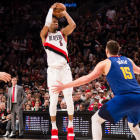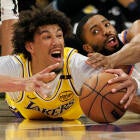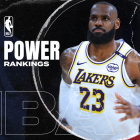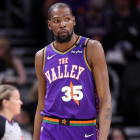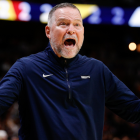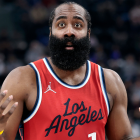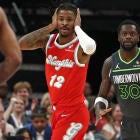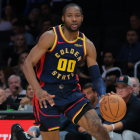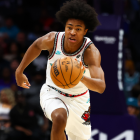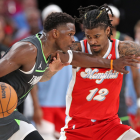MIdway through the fourth quarter of Game 6 against the Denver Nuggets on Thursday, Portland Trail Blazers wing Rodney Hood hit a 3-pointer. The shot gave him 25 points and the Blazers a 14-point lead. "Man, he is a different guy," ESPN announcer Mark Jones said. "He has gone through an incredible transformation this series."
As the Blazers and Nuggets have battled for a Western Conference finals berth, Hood's redemption story has been told over and over again. With the Cleveland Cavaliers last season, Hood was in and out of the rotation in the playoffs, looking unsure of himself as jumpers clanked off the rim and his market value sunk.
"I was down on myself," Hood told reporters after the Blazers' 119-108 win forced a Game 7. "I didn't really know how to get out of that, you know what I mean? It was a dark moment for me."
In free agency, Hood had to settle for signing the one-year qualifying offer to stay in Cleveland, where he was essentially irrelevant until Portland acquired him in exchange for a couple of second-round picks in February. He didn't stand out in the regular season or the Blazers' first-round series against the Oklahoma City Thunder, which makes his exploits against Denver -- he hit the game-winner in the fourth overtime in Game 3 and is averaging 16.2 points on 62.4 percent shooting in the series -- even more remarkable.
If you had time-traveled here from July 2017, however, this would all seem much less surprising, aside from the fact it's happening in Portland. Back then, in the immediate aftermath of Gordon Hayward leaving Utah Jazz, exec Dennis Lindsey said he believed Hood could be their primary scorer. Hood averaged 18.1 points in the first 24 games of 2017-18, but then Donovan Mitchell emerged and, with restricted free agency coming up, Lindsey's front office traded him to the Cavs.
"The talent has always been there," Hood said Thursday. But what are we supposed to make of his wild swings in production? This isn't a P.J. Tucker story, in which a player initially doesn't make it, only to find his niche years later. Hood's skills genuinely haven't changed, and the same is true for several role players enjoying similar success. His former Cleveland teammate George Hill has thrived in the playoffs for the Milwaukee Bucks, mere months after he was traded for draft picks. His current teammate Enes Kanter was waived by the New York Knicks in February and is now in the Blazers' starting lineup. Austin Rivers, dumped by the Washington Wizards and waived by the Phoenix Suns, played 33 minutes in the Houston Rockets' win over the Golden State Warriors on Monday. Here are three lessons to learn from this:
Fit is everything
If you're in the NBA and not a superstar, you're probably going to have to adjust to your team rather than hoping that the team will adjust to you. Playmakers need spacing in order to show what they can do. Shooters need good passers to set them up. Elite athletes might not look useful if their teams never run. There are all sorts of variables at play, from the personality of the coach to the philosophy of the general manager.
Early in the season, Rivers told The Athletic's Fred Katz that he wanted to exclusively shoot 3s and layups. "I'll probably be the most extreme case of the analytic movement this year," he said. It is no wonder, then, that he looks at home in Houston.
In Hood's case, his smooth pick-and-roll game was essentially shelved next to LeBron James last season. Unlike Utah, Cleveland did not run a motion-oriented offense in which he would touch the ball frequently and feel involved. He was essentially a spot-up shooter with a little bit of secondary playmaking responsibility. On a possession-by-possession basis, James dictated whether or not he would get opportunities.
This is not to say that the Cavaliers should have taken the ball out of James' hands in order to run an equal-opportunity system. Hood, however, is far from the only player who has been uncomfortable in that situation. Cleveland sent Jae Crowder to Utah when it acquired Hood, and after Crowder's first game with the Jazz, he said he "got back to having fun playing basketball." He also praised coach Quin Snyder for giving players freedom, which brings us to…
Empowerment helps
You've heard countless players credit their coaches and teammates for giving them confidence after a big game or during a breakout season. These aren't always empty words. There is a direct relationship between freedom and confidence, and it is difficult to play your best if you're worried about the coach taking you out of the game the first time you mess up.
Brooklyn Nets guard Spencer Dinwiddie believes there are two types of confidence: belief in your abilities and situational confidence. You can have the former, but it won't look that way on the court without the latter. To Dinwiddie, the situational confidence he has in Brooklyn comes from being encouraged to play his game and learn from mistakes. He likes to say "the green light is the greatest drug known to man."
Hood appears to have the green light in Portland, at least in this series. The Blazers need his offense on the second unit, and he can take some pressure off of Damian Lillard and C.J. McCollum when Denver is focused on stopping them. He definitely did not have the green light this time last year.
Empowerment cannot be totally disentangled from fit. Creators are inherently less valuable on a team stacked with them. Boston Celtics guard Terry Rozier told ESPN's Jackie MacMullan that he "felt like I went from the passenger seat to the trunk" when Kyrie Irving and Hayward returned. Rozier's season surely would have had a different flavor if he had been traded to a team that needed more from him. As a contrast, think about De'Aaron Fox, who had a spectacular second season on a team that could afford to give him the keys and tell him to drive as fast as he liked.
Matchups, matchups, matchups
Hood only scored 16 total points in five first-round games and is averaging slightly more than that number per game in the second round. This is how he explained it: "OKC series, I was more of a spacer. You know, Dame and C.J. just had a great rhythm and it was more of trying to affect winning: playing defense, getting deflections, those type of things. This series, you know, I got a matchup that I like. I'm real aggressive."
More specifically: "A lot of times, (Jamal) Murray is guarding me. Not to take away from him as a defender, but he's smaller and I feel like I can get a shot off anytime."
Against the Thunder, Lillard and McCollum were unstoppable, and they were responsible for almost all of the Blazers' playmaking. Lillard had a usage rate of 31.2 percent, McCollum 27.3 percent and everybody else was at 17.6 percent or lower. At 10.9 percent, Hood had the lowest usage rate on the team. Against the Nuggets, Lillard (28.9 percent) and McCollum (27.1 percent) have remained Portland's most important offensive players, but they have not been as consistently efficient as they were in the first round. In need of a jolt, Terry Stotts' coaching staff turned to Hood, a 6-foot-8 playmaker who happens to be facing a team that lacks size on the wing.
Meanwhile, enormous and lovable Philadelphia 76ers center Boban Marjanovic has proven to be unplayable against the Toronto Raptors: In a stint spanning two minutes and 23 seconds on Thursday, the Raptors went on a 5-0 run. When Marjanovic checked back in for another two minutes and eight seconds, Toronto went on an 8-0 run. In the first round against the smaller Brooklyn Nets, Philadelphia had a plus-10.5 net rating with him on the court, thanks largely to a 41.3 percent offensive rebounding rate.
This time of year, every team is looking for plays, lineups and strategies that work against one specific opponent, not what will work most of the time over an 82-game season. Denver has yet to find an answer for Hood, to the point where Denver Stiffs' Adam Mares suggested that power forward Paul Millsap should get a shot at him. He is an obvious X-factor in Game 7, but if Portland wins, there is no guarantee he will have the same role in the conference finals.
![[object Object] Logo](https://sportshub.cbsistatic.com/i/2020/04/22/e9ceb731-8b3f-4c60-98fe-090ab66a2997/screen-shot-2020-04-22-at-11-04-56-am.png)








